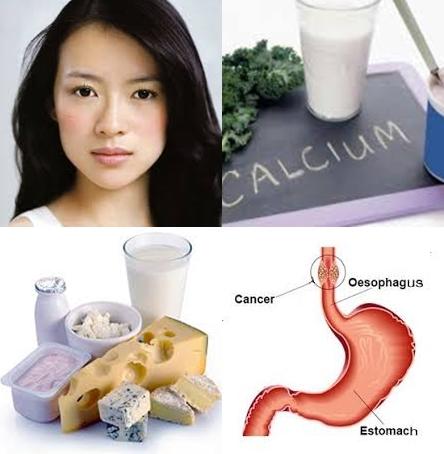
Objectives:
Although several epidemiological studies have investigated the association between dietary calcium intake and the risk of esophageal cancer, the results are inconsistent. Therefore, this review article (meta-analysis) has been conducted.
Does dietary calcium intake reduce risk of esophageal cancer?
Study design:
This review article included 3 cohort studies and 14 case-control studies, including 3,396 cases (subjects with esophageal cancer) and 346,815 controls (subjects without esophageal cancer).
Egger’s test showed no evidence of significant publication bias.
The sample size was large enough to evaluate the effect of calcium intake on esophageal cancer.
A dose-response effect analysis could not be performed due to the incomplete data of dietary calcium intake.
The average of highest dietary calcium intake in Asian populations was 621 mg/day.
Results and conclusions:
The investigators found for highest vs. lowest dietary calcium intake a significant reduced risk of 20% for esophageal cancer [pooled OR = 0.80, 95% CI = 0.71-0.91, I2 = 33.6%].
This significant reduced risk was also found in studies conducted in Asia [OR = 0.67, 95% CI = 0.52-0.86, I2 = 0.0%], studies published after 2000 [OR = 0.64, 95% CI = 0.53-0.77, I2 = 0.0%), studies adjusted for dietary energy intake [OR = 0.83, 95% CI = 0.70-0.98, I2 = 3.6%], studies of esophageal squamous cell carcinoma [OR = 0.76, 95% CI = 0.60-0.96, I2 = 28.3%], cohort studies [OR = 0.67, 95% CI = 0.54-0.84, I2 = 23.6%] and studies with high quality score [OR = 0.76, 95% CI = 0.66-0.87, I2 = 12.7%].
The investigators found in sensitivity analysis (conducted by leaving one study out in turn and pooling the ORs of the remaining studies) the summary ORs did not substantially change, which indicated that the results were statistically robust.
The investigators concluded that a higher intake (621 mg/day) of dietary calcium has protective effect against esophageal cancer - especially esophageal squamous cell cancer - in Asian populations. To further solidify the association of dietary calcium intake with the risk of esophageal cancer, well-designed studies - especially prospective cohort studies with validated FFQ and adjusted for dietary energy intake - should be conducted.
Original title:
Protective Effect of Dietary Calcium Intake on Esophageal Cancer Risk: A Meta-Analysis of Observational Studies by Li Q, Cui, L, […], Wang L.
Link:
https://www.ncbi.nlm.nih.gov/pmc/articles/PMC5452240/
Additional information of El Mondo:
Find more information/studies on calcium, significant/cohort/95% CI and cancer right here.